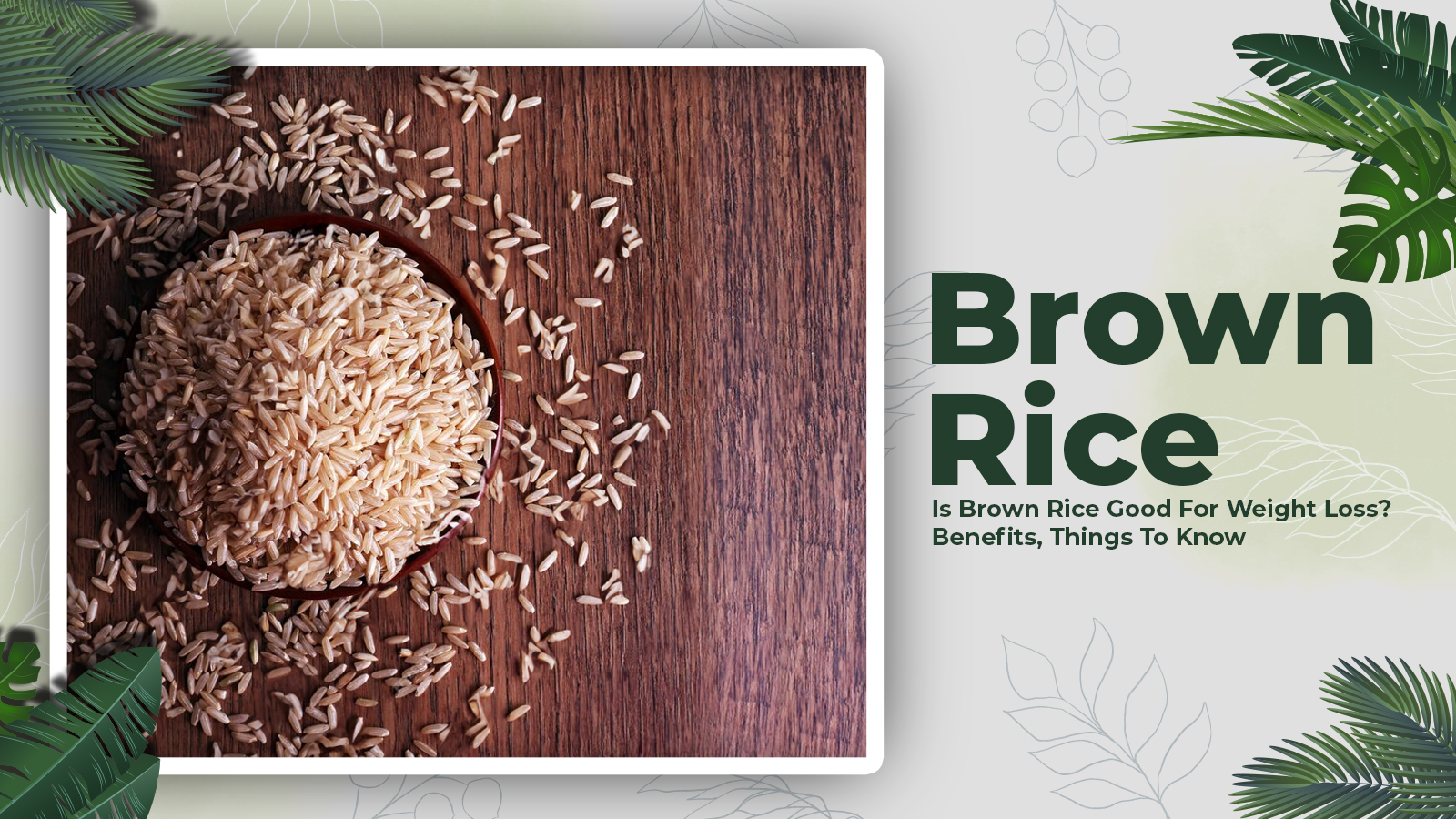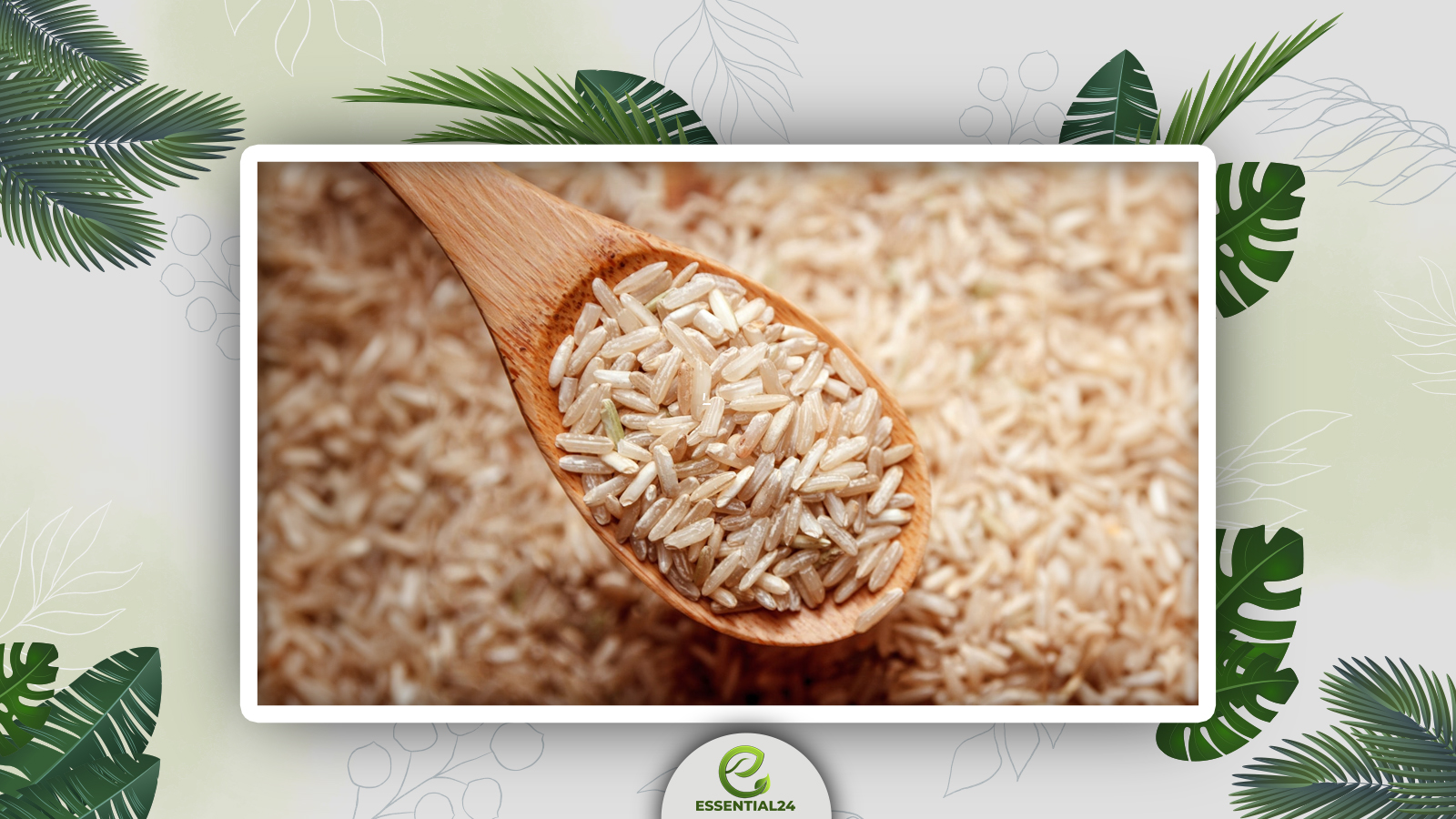Incorporating brown rice into your diet not only aids in weight management but also enhances overall health. This nutrient-dense grain, unlike white rice, retains its fiber-rich bran layer and germ through processing, delivering essential nutrients. The fiber in brown rice supports digestion and promotes satiety, potentially reducing overeating. Additionally, its lower glycemic index helps in maintaining stable blood sugar levels, crucial for controlling hunger. ‘Is Brown Rice Good For Weight Loss?’ Yes, and beyond aiding in weight loss, brown rice is rich in vitamins, minerals, and antioxidants, making it a valuable addition to a health-conscious diet.

1. What Is Brown Rice? Types Of Brown Rice
Brown rice is a whole grain rice that retains its bran and germ layer, giving it a brown color, after removing the inedible outer hull. It comes in various types, each with its own unique characteristics.
- Short Grain Brown Rice: This variety is sticky and perfect for dishes like rice puddings.
- Medium Grain Brown Rice: Moist and tender, it’s great for soups and salads.
- Long Grain Brown Rice: With a chewy texture and nutty flavor, it’s commonly used in dishes like rice pilaf.
- Light Brown Rice: This type has had half of its bran removed, resulting in a lighter color and a subtle nutty taste.
Each type of brown rice has distinct textures, flavors, and cooking times, providing versatility in culinary creations.

2. Is Brown Rice Effective for Weight Loss?
Replacing refined grains with brown rice could be a smart move if you’re aiming to shed some pounds.
Refined grains like white rice, white pasta, and white bread lack the fiber and nutrients found in whole grains like brown rice.
For instance, one cup (158 grams) of brown rice packs in 3.5 grams of fiber, whereas white rice falls short with less than 1 gram.
Fiber plays a crucial role in keeping you feeling full for longer, potentially leading to consuming fewer calories overall.
Studies have shown that individuals who incorporate more whole grains, such as brown rice, into their diets tend to weigh less than those who consume fewer whole grains.
A 2021 systematic review and meta-analysis revealed that diets including whole grains such as brown rice are associated with a lower risk of weight gain and obesity. These results suggest that whole grains can help curb hunger and cravings, keeping you satisfied.
In an earlier study, 40 overweight women who ate 2/3 cup (150 grams) of brown rice daily for six weeks experienced significant reductions in body weight and waist circumference compared to those consuming the same amount of white rice.
Moreover, the women who opted for brown rice also saw a notable decrease in blood pressure and CRP, a marker of inflammation in the body.
Making the switch to brown rice could be a simple yet effective step towards achieving your weight loss goals while also promoting overall health and well-being.

3. Nutritional Profile of Brown Rice
Though brown rice may seem simple, its nutritional value is far from it. When compared to white rice, brown rice offers a plethora of nutrients.
In nearly every aspect, brown rice outperforms white rice, despite having similar calorie and carbohydrate content.
Here’s what you’ll find in one cup of cooked long-grain brown rice:
- Calories: 248
- Carbs: 52 grams
- Fiber:3.2 grams
- Fat: 2 grams
- Protein: 5.5 grams
And in terms of essential nutrients:
- Thiamin (B1): 30% of the DV
- Niacin (B3): 32% of the DV
- Pyridoxine (B6): 15% of the DV
- Pantothenic acid (B5): 15% of the DV
- Iron: 6% of the DV
- Magnesium: 19% of the DV
- Phosphorus: 17% of the DV
- Zinc: 13% of the DV
- Copper: 24% of the DV
- Manganese: 86% of the DV
- Selenium: 21% of the DV
Brown rice is also a good source of folate, riboflavin (B2), potassium, and calcium.
Notably, brown rice is exceptionally rich in manganese, a lesser-known mineral crucial for various bodily processes, including bone development, wound healing, and nerve function. Just one cup of rice can fulfill nearly all your daily manganese needs.
Apart from vitamins and minerals, brown rice is packed with powerful plant compounds. It contains phenols and flavonoids, antioxidants that combat oxidative stress, linked to conditions like heart disease, cancer, and premature aging. These antioxidants protect cells from damage caused by free radicals and reduce inflammation in the body.
A 2014 study found that brown rice consumption significantly reduced inflammatory biomarkers, such as CRP or C-reactive protein.
Older studies suggest that the antioxidants present in rice may contribute to the lower prevalence of certain chronic diseases in regions where rice is a staple food.
4. Health Benefits of Brown Rice
While brown rice may not win any taste contests against its white counterpart, its nutritional perks might just convince you to make some changes in your diet. Here are some lesser-known health benefits of brown rice:
- Weight Loss Support Brown rice is a go-to food for weight loss. Packed with dietary fibers, it keeps you feeling full for longer periods, potentially leading to consuming fewer calories overall. Studies indicate that those who opt for brown rice tend to weigh less compared to those who prefer white rice. Making the switch from white to brown rice can also help trim down belly fat.
- Blood Sugar Regulation For naturally controlling blood sugar levels, opting for low-carb and low-fat options is key, making brown rice an ideal choice. Its low glycemic index means it digests slowly, preventing sudden spikes in blood sugar levels. Regular consumption of whole grains like brown rice has been linked to a reduced risk of developing type 2 diabetes. Brown rice’s components like phytic acid, fiber, and essential polyphenols contribute to the slower release of sugars into the bloodstream, promoting better health.
- Digestive Aid Brown rice is a digestive hero, thanks to its fiber content. It helps regulate intestinal movements and promotes regular bowel movements, offering relief from conditions like colitis and constipation.
- Cholesterol Management With its low cholesterol content, brown rice is a preferred choice for many. The oil present in brown rice helps reduce levels of bad cholesterol (LDL cholesterol) by binding to it in the digestive system and aiding in its excretion.
- Neuroprotective Properties Brown rice reduces the risk of cognitive dysfunction and neurodegenerative disorders. Its fiber content lowers cholesterol levels, which are associated with an increased risk of such diseases. Additionally, replacing cholesterol with healthier nutrients like fiber can help combat diseases like Parkinson’s or Alzheimer’s, as well as alleviate symptoms of depression, anxiety, or stress.
- Improved Maternal Health Postpartum depression can be alleviated with brown rice consumption. Nursing women showed positive results in mood improvement, depression reduction, and fatigue alleviation after incorporating brown rice into their diets.
- Bone Health Maintenance Rich in calcium and magnesium, brown rice supports bone health and can aid in treating conditions like arthritis and osteoporosis.
5. Potential Risks of Brown Rice
Although brown rice is lauded for its higher fiber and protein content relative to white rice, recognizing potential risks associated with its consumption is crucial.
- Anti-Nutrients Content: Brown rice contains anti-nutrients like phytic acid, which can hinder the absorption of essential vitamins and minerals. This interference may lead to adverse health effects and nutrient deficiencies, despite brown rice’s nutrient density.
- Arsenic Concerns: Brown rice tends to contain a higher concentration of arsenic compared to white rice. Arsenic exposure through diet can pose significant health risks. Long-term consumption of arsenic-rich foods like brown rice may increase the risk of various health issues associated with arsenic exposure.
It’s crucial to be mindful of these potential risks and consider moderation and variety in your diet to mitigate any adverse effects. Additionally, thorough cooking and rinsing of brown rice can help reduce its anti-nutrient content and minimize arsenic exposure.
6. Important Points to Note When Consuming Brown Rice for Weight Loss
When aiming to lose weight with brown rice, it’s essential to consider the following key points:
- Nutritional Benefits: Brown rice is a fiber-rich whole grain that can contribute to feelings of fullness, aiding in weight loss efforts. Additionally, it offers a plethora of essential nutrients such as vitamins, minerals, and antioxidants, supporting overall health.
- Preparation: Opt for healthier cooking methods like boiling or steaming brown rice instead of frying or using excessive oil or fat. Pairing brown rice with high-fiber vegetables or lean protein sources creates a well-rounded, nutritious meal.
- Glycemic Index: Brown rice boasts a lower glycemic index compared to white rice, resulting in slower digestion and absorption by the body. This gradual release of energy helps regulate blood sugar levels and prevents insulin spikes, which can support weight management.
- Caloric Content: Brown rice is relatively low in calories compared to other grains, allowing for a larger portion size without consuming excessive calories. This can aid in effective weight management by promoting satiety while maintaining a calorie-controlled diet.
7. Conclusion
To wrap it up, the question “Is Brown Rice Good For Weight Loss?” finds its answer in the numerous benefits that brown rice offers. Not only is brown rice a powerhouse of nutrition that supports weight loss, but it also enhances overall health. Its rich fiber content helps keep you full, aiding in weight management, while its lower glycemic index and wealth of nutrients promote stable blood sugar and provide essential vitamins and minerals. Switching to brown rice could be a simple step toward a healthier lifestyle, offering benefits that go beyond just weight loss


